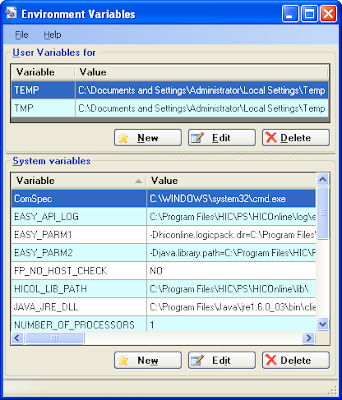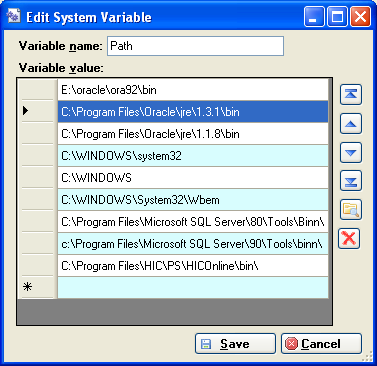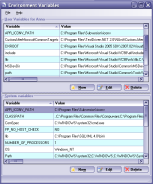Free Download
EnvMan-1.0.0.0.zip EnvMan-source-1.0.0.0.zipUser Guide
Introduction
Windows Environment Variables Manager (EnvMan) is a tool written in C# .Net intended to handle the administration of Windows Shell Environment Variables. It is designed to replace Control Panel System Environment Manager and easily manage long variable values.
Installation
In order to run this program you need to have .Net 2.0 runtime installed. After installing .Net 2.0 runtime download program binaries from the EnvMan Project Website. Unzip EnvMan-x.x.x.x.zip file to where you want and set a short cut to EnvMan.exe file to desktop or start menu. You are now ready to run application. In the future we are planning to offer a choice of Windows Installer (MSI) setups and "ClickOnce" for installations and upgrades.Getting Started Guide
Windows Environment Variables Manager (EnvMan) has a simple interface similar to common Environment Variables Editing tool in Systems control panel. Main screen lists User and System Environment Variables. "New", "Edit", "Delete" buttons allow create new environment variable, edit existing ones and delete. By clicking "New" and "Edit buttons Edit screen is shown.
Main screen lists User and System Environment Variables. "New", "Edit", "Delete" buttons allow create new environment variable, edit existing ones and delete. By clicking "New" and "Edit buttons Edit screen is shown.
 Enter Variable name and at least one value in the grid to create a new variable. You can use Up/Down arrow buttons on right of the grid to change order of the rows. Folder button allows to select specific path as a value. Delete button removes selected value from the grid. Once you are ready click Save button or Cancel if no change needed. Changes will be reflected in the Main Screen grid.
Enter Variable name and at least one value in the grid to create a new variable. You can use Up/Down arrow buttons on right of the grid to change order of the rows. Folder button allows to select specific path as a value. Delete button removes selected value from the grid. Once you are ready click Save button or Cancel if no change needed. Changes will be reflected in the Main Screen grid.





3 comments:
Hi, it would be nice if you could switch between a recently used set of values for any given variable.
For example, if I have variable steve=c:\MyDir
and I often want to test some code where I need steve=c:\Debug
Then I would like to swap often.
Hey, nice tool. It would also be cool if you could save all the current set of variables to a file. This would be useful if you want to swap environment variables often.
Cheers
Hi, Thanks for a comment. Current Version 1.3 has an Import/Export Functionality. Have a look at Home page for a new release.
Cheers
Post a Comment